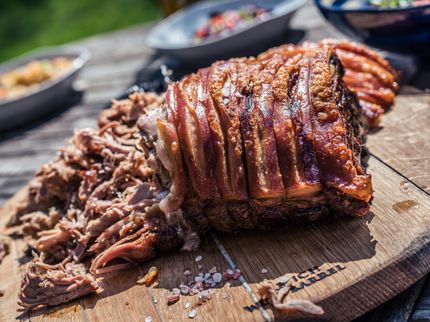Changing meat consumption: between tradition and innovation
Advertisement
meat remains an important part of the Swiss diet - even in times of growing plant-based alternatives. However, meat consumption preferences are changing: while the consumption of pork is steadily decreasing, the demand for poultry is increasing. Companies such as Ernst Sutter AG are adapting to these trends and focusing on sustainable production and innovation. Last updated on April 29, 2025 by Martina Graf
Meat consumption in Switzerland has changed over the decades. An increase from 1949 to 1987 was followed by a decline, since when consumption has remained largely stable. And although flexitarianism, vegetarianism and veganism have a strong media presence, around 94-95% of the population continue to eat meat, according to Proviande. A study by the University of St. Gallen also shows that although many people are reducing their consumption, they remain meat eaters.
"We have to react flexibly to consumption trends," says Reto Sutter, CEO of Ernst Sutter AG - the meat competence center of the fenaco-LANDI Group. "Pork currently makes up around 40% of our range, but this proportion is falling steadily, while poultry meat is increasingly in demand." He adds: "This continuing trend requires increased domestic production of poultry meat. Unfortunately, regulatory hurdles in Switzerland are making it difficult to adapt in a timely manner."
"Meat remains an important part of a healthy diet."
Despite changing dietary trends, meat remains a valuable food. In the new food pyramid, the proportion of meat is heavily devalued, as it is criticized in terms of health and environmental aspects. Reto Sutter takes a critical view of this: "I don't agree with this dietary recommendation. There is no scientific evidence that eating meat in the quantities commonly consumed today is harmful to health. Furthermore, the food pyramid should not be the subject of discussions about ecological issues."
At the same time, Ernst Sutter AG is open to today's food trends and is testing new markets. In 2024, the meat processor launched three vegan products based on spent grains - a by-product of beer production. "It was particularly important to us to use a high-quality Swiss raw material," explains Reto Sutter. "It remains to be seen whether these meat substitutes will prove themselves on the market."
"I see it as our task to offer meat consumers high-quality products."
Swiss meat production scores highly in international comparison with its high animal welfare standards and sustainable conditions. However, according to Reto Sutter, there has been no increase in demand for sustainably and ethically produced meat. He adds: "Consumers want to know where their meat comes from and how it is produced. That's why, as a pioneer in the label meat segment, we rely on clear labeling and traceability." Switzerland also offers ideal conditions for sustainable meat production thanks to its topography and abundant rainfall.
However, there is a discrepancy between intention and reality. "Although many consumers express a willingness to pay a higher price for label meat, in practice the majority often opt for the cheaper option," notes Reto Sutter. He is critical of government intervention to regulate: "Consumers should be responsible for what they put on their plates."
With around 1,000 employees throughout Switzerland and a turnover of around 611 million Swiss francs in 2024, Ernst Sutter AG is an important buyer of Swiss animals for slaughter and acts as an important link in the value chain. Its customers include retailers, specialist butchers, discounters and delivery and pick-up wholesalers.
"Traditional and new products have their raison d'être."
In view of changing consumer behavior and the increasing importance of sustainable practices, companies like Ernst Sutter AG must remain innovative. "We recognize trends early on and continuously adapt our market performance - with quality, responsibility and innovative strength. This is the only way we can secure our future and assume ecological responsibility at the same time," says Reto Sutter. And he emphasizes: "Our goal is not only to meet current demand, but also to make a sustainable contribution to food security in the long term."
Despite numerous challenges, Reto Sutter remains optimistic: "Political pressure will continue to increase, but the climatic, legal and social conditions in Switzerland are favorable. I am convinced that meat, plant-based and cell-cultivated alternatives will coexist. However, it will be several years before cell-cultured alternatives are ready for the market and gain widespread acceptance. Swiss agriculture and the meat industry will continue to play an important role in supplying the Swiss population in the future. That is why we are gearing our company towards sustainable growth and long-term preservation."
Note: This article has been translated using a computer system without human intervention. LUMITOS offers these automatic translations to present a wider range of current news. Since this article has been translated with automatic translation, it is possible that it contains errors in vocabulary, syntax or grammar. The original article in German can be found here.
































































